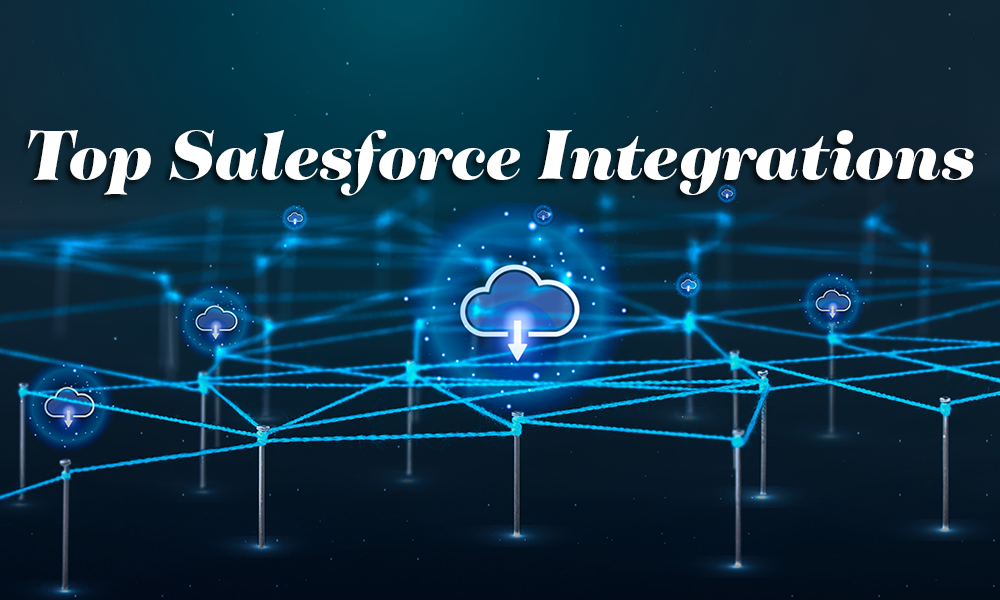The world of Salesforce CRM is dynamically evolving. Businesses, whether they are SMBs or 500 Fortune enterprises, all are in need of a cloud CRM that could help them grow 360 degrees, and that’s where come Salesforce and Salesforce integration services.
Did you know that the global market of Salesforce is expected to reach a valuation of US$ 33.5 billion by 2029? The last valuation was $13 billion USD in 2022. The rise is insane, isn’t it?
This indicates that businesses are looking for Salesforce integration solutions and it has amazingly paved the path of growth for Salesforce consulting partners.
In this blog post, we will discuss the amazing integration capabilities of Salesforce a that will definitely make your life super easy. You can thank us later, first read the post. We have penned it down for you after a thorough discussion with our Certified Salesforce consultants/developers, architects, and admins.
What Makes Salesforce Integration Beneficial for Your Business?
Salesforce is a complete business solution. Still there are a few things, which this advanced CRM couldn’t perform, and that’s where Salesforce integration comes into play. It is a process that combines the functionality of the cloud platform with other applications and delivers a full user experience.
Salesforce integration offers numerous benefits for businesses, enabling them to streamline their operations, enhance productivity, and improve customer experience. Here are some key benefits of Salesforce integration:
Data Centralization
Salesforce integration allows businesses to centralize their data from various sources into a single unified platform. This eliminates data silos and provides a comprehensive view of customer information, sales data, marketing insights, and more. It enables teams to make informed decisions based on accurate and up-to-date data.
Improved Efficiency
By integrating Salesforce with other business systems such as CRM, ERP, marketing automation, or customer support tools, businesses can automate data transfer, eliminate manual data entry, and reduce duplicate efforts. This leads to improved operational efficiency, increased productivity, and time savings for employees.
Enhanced Customer Experience
Salesforce integration enables businesses to have a 360-degree view of their customers, including their interactions, preferences, and purchase history. With this comprehensive understanding, businesses can deliver personalized and targeted experiences to their customers, improving customer satisfaction, loyalty, and retention.
Streamlined Workflows
Integrating Salesforce with other systems allows for seamless data flow and automated workflows. For example, integrating Salesforce with an email marketing tool can automate lead-nurturing campaigns based on customer interactions, ensuring timely and relevant communication. Streamlined workflows eliminate manual tasks, reduce errors, and improve overall process efficiency.
Real-time Insights
Salesforce integration facilitates real-time data synchronization and reporting, providing businesses with accurate and actionable insights. Real-time dashboards and reports enable timely decision-making, identification of trends, and monitoring of key performance indicators (KPIs). It empowers businesses to make data-driven decisions and adapt quickly to changing market dynamics.
Scalability and Flexibility
Salesforce integration provides businesses with a scalable and flexible solution that can grow and evolve with their needs. As businesses expand and introduce new systems or applications, Salesforce integration allows for the seamless integration of new technologies, ensuring continuity and avoiding data fragmentation.
Collaboration and Communication
Salesforce integration fosters collaboration and communication within teams by bringing data and processes together. Integrated systems enable sales, marketing, and customer support teams to access relevant information, collaborate on projects, and share insights, leading to improved teamwork and better outcomes.

Top 5 Salesforce Integrations That Every Business Should Consider
Salesforce Facebook Integration
Salesforce Facebook integration offers numerous benefits for businesses, allowing them to leverage the power of social media and customer relationship management (CRM) to drive growth and enhance customer engagement.
By integrating Salesforce with Facebook, businesses can streamline their marketing efforts, improve lead generation and nurturing, and provide superior customer support. Some key benefits of Salesforce Facebook integration include:
- Enhanced Social Media Marketing
- Targeted Advertising
- Improved Lead Generation
- Enhanced Lead Nurturing
- Seamless Customer Engagement
- Social Listening
- Brand Monitoring
- Unified Data
- Insightful Analytics
Salesforce Mailchimp Integration
Salesforce Mailchimp integration offers a range of benefits for businesses, combining the power of customer relationship management (CRM) with email marketing automation.
This integration allows businesses to streamline their marketing efforts, nurture leads, and drive engagement. Salesforce Mailchimp integration ensures that customer data remains consistent and up-to-date across both platforms. This eliminates the need for manual data entry and reduces the chances of errors, ensuring that businesses have accurate and reliable customer information.
Here are some key benefits of Salesforce Mailchimp integration:
- High Email Marketing Automation
- Advanced Audience Segmentation
- Advanced Audience Targeting
- Improved Lead Nurturing
- Comprehensive Analytics & Reporting
- Streamlined Workforce Process
Salesforce Twilio Integration
In today’s fast-paced and digital world, effective communication is key to business success. Integrating Salesforce with Twilio brings together two powerful platforms to unlock a whole new level of communication capabilities for businesses.
Whether it’s reaching out to customers, managing customer interactions, or automating business processes, the Salesforce Twilio integration empowers businesses to streamline their communication workflows and deliver exceptional customer experiences.
Twilio, a cloud communications platform, provides a range of communication channels such as SMS, voice calls, video, and chat. When integrated with Salesforce, the world’s leading customer relationship management (CRM) platform, businesses gain access to a comprehensive suite of tools and features to engage customers, automate processes, and drive productivity.
Here are some key benefits of Salesforce Twilio integration:
- Seamless Communication with Customers
- Automated Communication Workflows
- Enhanced Customer Engagement
- Efficient Lead Management
- Advanced Reporting and Analytics
- Scalability and Flexibility
Salesforce HubSpot Integration
Salesforce HubSpot integration brings together the power of Salesforce CRM and HubSpot’s marketing automation and customer relationship management platform, offering numerous benefits for businesses.
Integration between Salesforce and HubSpot enables seamless data synchronization between the two platforms, facilitating better alignment between sales and marketing teams.
It also allows for the sharing of valuable customer information, such as lead data, customer interactions, and campaign performance, fostering collaboration and improving overall efficiency.
Here are the key benefits of Salesforce HubSpot integration:
- Excellent Lead Nurturing and Management
- Improved Marketing Campaign Effectiveness
- Enhanced Customer Engagement and Personalization
- Unified Customer Data & Insights
- Streamlined Sales and Marketing Alignment
Salesforce QuickBooks Integration
Salesforce QuickBooks integration offers a powerful solution for businesses looking to streamline their financial processes and enhance their overall operational efficiency.
By seamlessly connecting Salesforce CRM with QuickBooks, companies can achieve a higher level of automation and synchronization between their customer relationship management and accounting systems.
One of the key benefits of Salesforce QuickBooks integration is the ability to automate the synchronization of financial data. This includes customer invoices, sales orders, payments, and inventory information. With real-time data synchronization, businesses can ensure that their financial records are always up-to-date and accurate in both Salesforce and QuickBooks. This eliminates the need for manual data entry and significantly reduces the risk of errors or discrepancies.
Here are the key advantages of Salesforce QuickBooks integration:
- Well-Managed Financial Data
- Properly Synced Financial Data
- Improved Sales and Accounting Alignment
- Seamless Quote-to-Cash Process
- 360-Degree Customer Insights
- Efficient Order Management
Some other integrations that are equally beneficial for your business are as follows –
- Pardot and Salesforce Integration
- SurveyMonkey and Salesforce Integration
- Slack and Salesforce Integration
- Mulesoft and Salesforce Integration
- AmazonS3 and Salesforce Integration
Conclusion
Salesforce integrations play a crucial role in enhancing the capabilities and efficiency of businesses across various industries. By seamlessly connecting Salesforce with other essential applications and platforms, companies can unlock a multitude of benefits that drive growth, improve productivity, and enhance customer experiences.
The discussed Salesforce integrations, including Facebook, Mailchimp, Twilio, HubSpot, and QuickBooks, offer unique advantages tailored to specific business needs. These integrations enable businesses to streamline processes, automate data synchronization, improve collaboration, gain actionable insights, and provide a seamless customer journey. With these integrations, businesses can maximize the value of their Salesforce investment and harness the power of connected systems to drive success.
With the support of an experienced professional, you can leverage all such benefits for your business. FEXLE is a Salesforce Crest (Gold) consulting partner. Their certified team of professional and illustrious industry experience will harness the power of cloud CRM for you and integrate it into your legacy system, making it more robust and result-driven.








